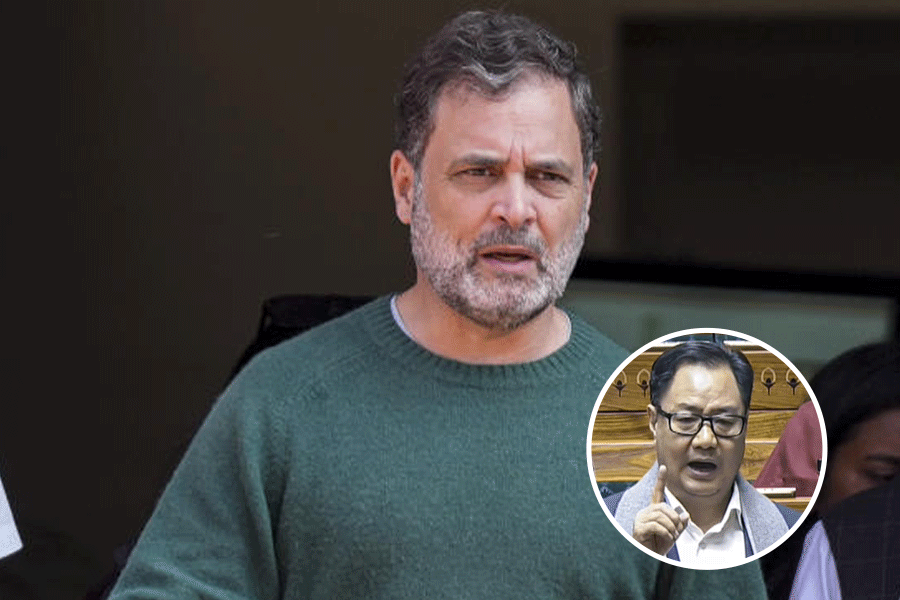 |
New Delhi, Dec. 30: At all times and in all countries, there is only one test for good generalship — has the general led his army to victory in war?
When India’s 20th chief of army staff, the heavy-smoking Tamil Brahmin, Sundarajan Padmanabhan, 62, retires on the morrow, he will go down as the general who mobilised his army for a war that was not waged.
“We were absolutely ready (but waited) for a political decision,” General Padmanabhan said today on the 10-month-long standoff with Pakistan under Operation Parakram.
He did not know this morning, but on the other side of the border, General Pervez Musharraf was saying much the same: “I personally conveyed messages to (Indian) Prime Minister Vajpayee through every international leader who came to Pakistan, that if Indian troops moved a single step across the International Border or the Line of Control, they should not expect a conventional war from Pakistan.”
At the fag end of the year, just as at its beginning, fate has had a strange way of clubbing the two generals together in the headlines. One is a commando by training; the other an artillery officer. One has the political authority to decide whether or not to wage war while the other has only the military authority to prepare for war and leave the decision to the politicians.
On January 11, Padmanabhan addressed a press conference for the first and last time, a day before Musharraf made what was touted as a “landmark” speech in which he promised to disband the jihadi infrastructure.
Padmanabhan — Paddy to his friends — was fielded by the government to pre-empt Musharraf and at the same time pile on the pressure. He did his job well, too, surprising the media and the political establishment with his erudition and air of quiet confidence.
“We are not a flappy army,” Padmanabhan had said. “We know what to do, all our plans are clearly laid out... yes, it is true, that (in the India-Pakistan context) everything is under the glare of the world’s media. But the challenge lies in retaining the element of surprise even then.”
Should Pakistan use the nuclear option, Padmanabhan went on, its existence will be in doubt.
And now, on the eve of calling it a day, General Padmanabhan has to contend with General Musharraf again. Musharraf has claimed it was Pakistan’s threat to press the nuclear button that staved off a war.
At least twice in the last 12 months, India and Pakistan nearly went to war. The first was in January and the second, in May, after the attack on the army camp in Kaluchak, Jammu. In January, the armed forces had mobilised in three weeks in the wake of the attack on Parliament. In May, Padmanabhan was in Kathmandu, where he said the time was ripe to take action. In January, the situation was defused somewhat by Musharraf’s speech. In May-June, Vajpayee blew hot in Kupwara, on a visit to Kashmir, and blew cold in Jammu when he said the skies are clear of war clouds.
It will be some time before the full story of Operation Parakram is known. Padmanabhan today said “it was too close to events” for him to speak out. He was not contemplating a book in the near future. At the same time, he was clear that the army had presented a plan of action to the political establishment.
“When we assess our adversaries, we assess all its capabilities. We had evaluated it and were ready to cope with it,” Padmanabhan said when asked if Pakistan’s nuclear threat had been accounted for.
Critics of General Padmanabhan have been known to suggest that he was presented with a rare opportunity. Not since the Bangladesh war — not even during the 1999 Kargil war or during Operation Brasstacks in 1987 — had an army chief been able to fully mobilise his forces. Despite that, the critics suggest, the army headquarters was not able to present an option that the political establishment considered viable. Such action, they again suggest, would not have required mobilisation on a huge scale but special forces (commando) operations across the LoC.
Padmanabhan took charge as army chief after a series of important assignments. He is rated most highly for his stint in Kashmir, first as commander of the Valley-based 15 Corps and later as northern army commander.
He dared speak out his mind on the cost of retaining Kashmir — that it will have to be a level of contained militancy that cannot be eliminated. He even risked annoying Farooq Abdullah. He backed up political efforts to spread confusion in the ranks of the under-ground.
“He had developed into a fine counter-insurgency expert,” said an officer who has served under Padmanabhan.
“Maybe, that was his forte which turned out to be a handicap when presented with the opportunity to lead a full army to war.”
There are other experts, serving and retired, who rate General Padmanabhan as a highly accomplished officer comparable to the late General Krishnaswamy Sundarji. No army chief, they say, has been able to ensure a year-long training in war. The results of the total mobilisation of the forces deserve to be assessed over the next two to three years and not immediately.
“It is simple, really,” a retired major general pointed out. “Padmanabhan thinks like an artillery officer. Every artillery man wants his batteries of big guns ready at all times, keeps the powder dry, the machines oiled and checks for defects. Padmanabhan has used the opportunity presented to him by circumstances to do the same with the whole army. Now we know where it is rusty and where it is not. Now we have a bedrock of information on which to build up further.”
Padmanabhan is acutely aware of this but is not given to self-advertisement. “We now have the best trained army. There has been a year-long practice in waging war,” he claimed this morning.
He flies to hometown Chennai tomorrow morning by service aircraft. His place will be taken in the new year by Lt Gen. Nirmal Chander Vij.
In Pakistan, the General is still in his labyrinth.










